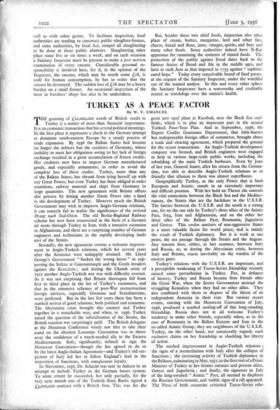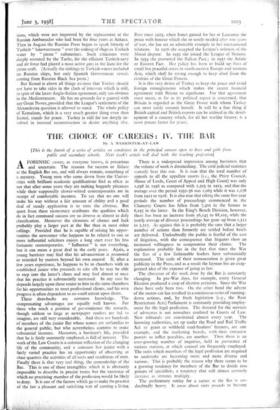TURKEY AS A PEACE FACTOR
By W. V. EMANUEL
THE granting of Lio,000,000 worth of British credit to Turkey is a matter of more than financial importance. It is an economic transaction that has several political meanings. In the first place it represents a check to the German attempt to dominate south-eastern Europe by a steady process of trade expansion. By 1936 the Balkan States had become no longer the debtors but the creditors of Germany, whose inability to meet her obligations owing to her lack of foreign exchange resulted in a great accumulation of frozen credits. Her creditors now have to import German manufactured goods, and especially armaments, in order to avoid the complete loss of these credits. Turkey, more than any of the Balkan States, has shrunk from tying herself up with any Great Power, but even Turkey has been obliged to order munitions, railway material and ships from Germany in large quantities. The new agreement with Britain offsets this process by letting another Great Power take a hand in the development of Turkey. However much the British Government may wish to improve Anglo-German relations, it can scarcely fail to realge the significance of the revived Drang nach Sud-Osten. The old Berlin-Baghdad Railway scheme has now been resurrected in the form of a German air route through Turkey to Iran, with a tentative extension to Afghanistan, and there are a surprising number of German engineers and technicians in the rapidly developing lands east of the Straits.
Secondly, the new agreement crowns a welcome improve- ment in Anglo-Turkish relations, which for several years after the Armistice were unhappily strained. Mr. Lloyd George's Government " backed the wrong horse " in sup- porting the Sultan at Constantinople and the Greek invaders against the Kemalists ; and during the Chanak crisis of 1922 another Anglo-Turkish war was with difficulty averted. So it was not surprising that Britain thereupon fell from first to third place in the list of Turkey's customers, and that in the extensive schemes of post-War reconstruction foreign advisers, especially Germans and Scandinavians, were preferred. But in the last few years there has been a marked revival of good relations, both political and economic. The Abyssinian crisis brought this . country and Turkey together in a remarkable way, and when, in 1936, Turkey raised the question of the refortification of the Straits, the British reaction was surprisingly mild. The British delegates at the Montreux Conference wisely saw that to take their stand on the obsolete Lausanne Convention was to throw away the confidence of a much-needed ally in the Eastern Mediterranean. Italy, significantly, refused to sign the Montreux Convention—though she has agreed to do so by the latest Anglo-Italian Agreement—and Turkey's old sus- picions of Italy led her to follow England's lead in the imposition of Sanctions, with conspicuous loyalty.
In November, 1936, Dr. Schacht was sent to Ankara in an attempt to include Turkey in the German barter system. To some extent he succeeded, but only partially, for the very next month one of the Turkish State Banks signed a £3,000,000 contract with a British firm. This was for the great new steel plant at Karabuk, near the Black Sca coal- fields, which is to play an important part in the second Turkish Four-Year Plan. And in September, 1936, the Export Credits Guarantee Department, that little-known but indispensable foreign office of commerce, brought about a trade and clearing agreement, which prepared the ground for the recent transactions. An Anglo-Turkish development company was formed, and British engineers were engaged to help in various large-scale public works, including the rebuilding of the main Turkish harbours. Even by June of last year, General Ismet, after his return from the Corona- tion, was able to describe Anglo-Turkish relations as so friendly that allusion to them was almost superfluous.
Geographically Turkey, as the only Power that is both European and Asiatic, stands in an extremely important and difficult position. With her hold on Thrace she controls the vital connexions between the Black Sea and the Mediter- ranean, the Straits that are the backdoor to the U.S.S.R. The barrier between the U.S.S.R. and the south is a strong one, for on the one side lie Turkey's three allies of the Asiatic Pact, Iraq, Iran and Afghanistan, and on the other her three allies of the Balkan Pact, Roumania, Jugoslavia and Greece. This cordon sanitaire of non-aggressive States is a most valuable factor for world peace, and is mainly the result of Turkish diplomacy. But it is weak at one point, the sea passage through the Straits and the Aegean. Any tension here, either, as last summer, between Italy and Russia, or, as during the Abyssinian crisis, between Italy and Britain, reacts inevitably on- the warden of the eastern gates.
Turkey's relations with the U.S.S.R. are important, and a perceptible weakening of Turco-Soviet friendship recently caused some perturbation in Turkey. For, in defiance of history, Turkey and Russia became firm friends after the Great War, when the Soviet Government assisted the struggling Kemalists when they had no other allies. They also combined with them to dispose of the threat of an independent Armenia in their rear. But various recent events, starting with the Montreux Convention of July, 1936, produced a marked cooling-off of this long-standing friendship. Russia does not at all welcome Turkey's tendency to make other friends, especially when, as in the case of Roumania in the Balkan Entente and Iran in the so-called Asiatic Group, they are neighbours of the U.S.S.R. Turkey, on the other hand, not unnaturally regards such exclusive claims on her friendship as shackling her liberty of action.
The marked improvement in Anglo-Turkish relations ; the signs of a reconciliation with Italy after the collapse of Sanctions ; the increasing activity of Turkish diplomacy in the Balkans, culminating in May, '937, in the first visit of a Prime Minister of Turkey to her former enemies and present allies, Greece and Jugoslavia ; and finally, the signature in July of the long-awaited " Asiatic " Pact, all seemed to displease the Russian Government, and visible signs of a rift appeared. The Press of both countries criticised Turco-Soviet rela- dons, which were not improved by the replacement of the Russian Ambassador who had been for four years at Ankara. Then in August the Russian Press began to speak bitterly of Turkish " lukewarmness " over the sinking of ships in Turkish water by " pirate " submarines. Such criticisms were deeply resented by the Turks, for the efficient Turkish navy and air force had played a most active part in the hunt for the pirate craft. (Actually the sinkings in Turkish waters included no Russian ships, but only Spanish Government vessels coming from Russian Black Sea ports.) But Kemal is above all things anxious that Turkey should not have to take sides in the clash of interests which is still, in spite of the latest Anglo-Italian agreement, only too obvious in the Mediterranean. He has no grounds for a quarrel with any Great Power, provided that the League's settlement of the Alexandretta question is allowed to stand. The whole policy of Kemalism, which is a very much greater thing even than Kemal, stands for peace. Turkey is still far too deeply in- volved in internal reconstruction to desire anything else. Ever since 1923, when Ismet gained for her at Lausanne the peace with honour which she so sorely needed after nine years of war, she has set an admirable example in her international relations. In 1926 she accepted the League's solution of the Mosul dispute. In 1932 she joined the League of Nations. In 1934 she promoted the Balkan Pact ; in 1937 the Asiatic or Eastern Pact. Her policy has been to build up blocs of small but peaceful states in south-eastern Europe and western Asia, which shall be strong enough to keep aloof from the rivalries of the Great Powers.
It is this very desire of Turkey to keep the peace and avoid foreign entanglements which makes the recent financial agreement with Britain so significant. For that agreement must mean, as far as its political aspect is concerned, that Britain is regarded as the Great Power with whom Turkey can most safely commit herself. It will be a fine thing if British capital and British experts can be utilised in the devel- opment of a country which, for all her warlike history, is a most potent factor for peace.



















































 Previous page
Previous page